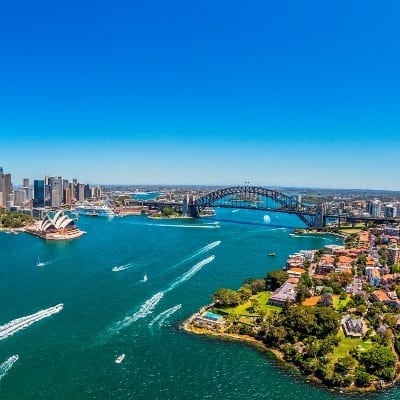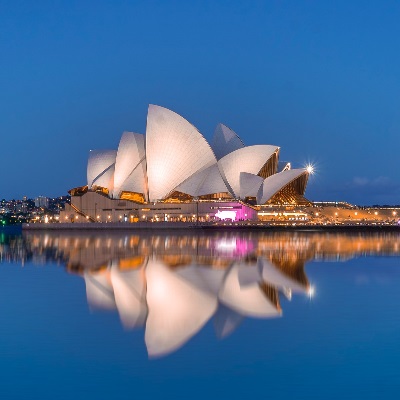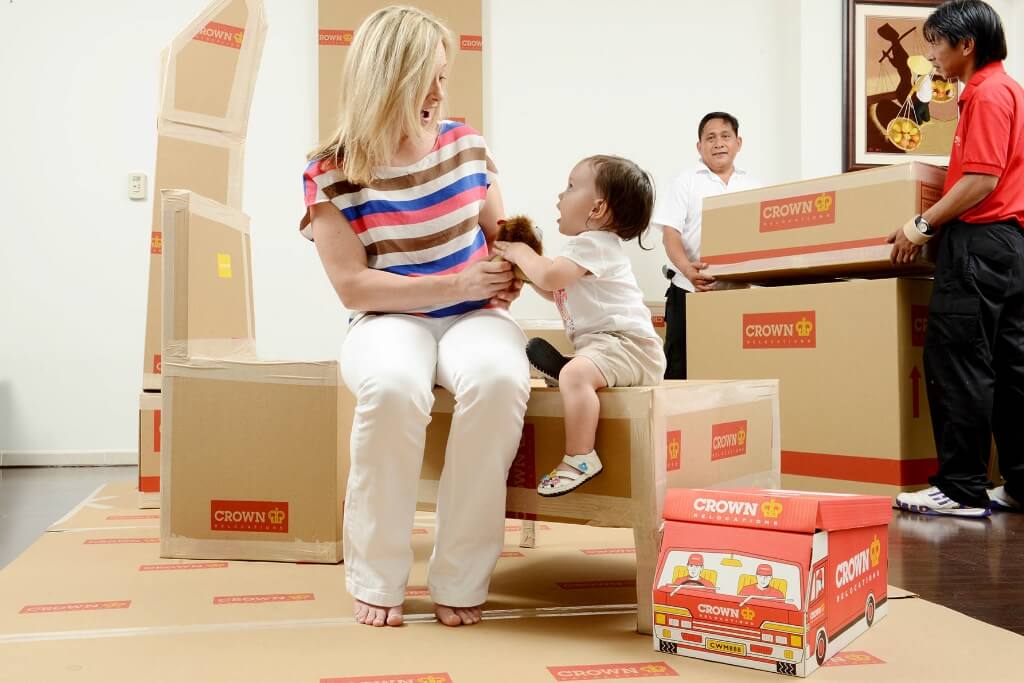Crown Relocations is NZ’s leading moving company.
Moving to Sydney? We’re here to help you plan your relocation and discover everything Sydney, Australia has to offer. Crown Relocations are an international relocations company, specialising in international removals, storage, overseas moving, movers insurance, relocation services and lots more. We will even relocate your vehicle and pets. With a range of options available, whether you are relocating your entire household to Sydney or just your treasured possessions we have a moving service to suit you.
Our team is available to answer any relocation questions you may have. Call us on: 0508 227 696, alternatively complete a quote form online for moving to Sydney & we’ll be back in touch in no time.
Every year thousands of Kiwis make the decision to move to Australia. There is so much to think about when moving to a new country. One of the biggest decisions is which moving company will you choose to pack and relocate your household goods and personal effects. Read some of the reasons we would like you to consider Crown as your Trans Tasman moving partner.

With a sunny, vibrant atmosphere, internationally recognised tourist attractions and an event filled calendar, Sydney is one of the world’s most-loved cities. Located on the east coast of Australia, Sydney is the state capital of New South Wales and is now home to almost five million people, making it the most populous city in Oceania. Read our latest blog: Time Out Sydney
Crown Relocations offer a genuine, professional ‘one company’ standard and have over 55 years experience as a market leader in New Zealand, contact us today for your move to Sydney, Australia!
New Zealand citizens are eligible to live and work in Australia without needing to apply for a visa of any kind. However, on entry to Australia a Special Category Visa (SCV) is assigned, which entitles the SCV holder to live and work in Australia indefinitely. The SCV is a temporary visa and doesn’t provide New Zealanders with the same rights as Australian citizens or permanent residents. New Zealand citizens moving to Sydney no longer have a right to permanent residency in Australia and must apply for this through the Department of Immigration and Citizenship (DIAC).
There are a number of different types of visa available for migrants to Australia, to find out the different options visit the Department of Immigration and Border Control website. As of July 1st, 2014 it is now mandatory to complete a skills assessment form when applying for visas. The skills assessment forms require personal information based around work experience and qualifications, these forms can also be found at the DIAC website.
The local currency is the Australian dollar. Each dollar is worth 100 cents and coins come in denominations of 5, 10, 20 and 50 cents as well as $1 and $2. Notes are $5, $10, $20, $50 and $100. There are many different choices that can be made when it comes to converting currencies. It’s strongly suggested not to take large sums of money or travellers’ cheques with you to convert overseas — this is because banks are known to charge high conversion rates when dealing with cash.
Migrants may find it beneficial to open up an Australian bank account before actually arriving in the country. This also helps to minimise the amount of cash that needs to be carried while travelling. When it comes to opening an Australian bank account without actually being in the country yet, several banks offer application forms that can be filled out online – Commonwealth Bank, Westpac, ANZ and NAB all provide an online sign-up service.
When moving overseas, it’s important to find a reliable service for converting your money online. Using the right service can help you save a significant amount. For more details, learn about Money Transfer Services.

In Australia, drivers use the left-hand side of the road and all cars are right-hand drive. Speed limits in suburban areas are typically 50km/h or 60km/h and 100km/h on highways or freeways. If you’re planning on staying in New South Wales, you’re allowed to drive on an overseas license for up to three months after arriving in the country.
Although, these conditions also apply:
After three months you’re legally required to hold a New South Wales driving license. To obtain one you will need to pass a full test that includes practical driving as well as theory. For more details on this check the current regulations on Roads and Traffic Authority website.
Australia is subject to International Driving regulations, which mean that the acquisition of an International Drivers Permit or license allows overseas drivers to continue driving in Australia without further tests or applications, provided that a current drivers license is still held. More can be found out about International Driving Permits from The National Roads and Motorists’ Association website.
The public transport system in Sydney consists of trains, buses and ferries within the Sydney Metropolitan area. Its website contains time tables, trip planners and other relevant information.
The standard of education is high across most areas of Sydney. Expatriates most often enrol their children either in independent private schools or into the public school system, there are around 500 different schools that migrants can choose from. Schools in Sydney run on a four-term schedule: Term 1 typically goes from late January through mid-April, Term 2 from late April to early July, Term 3 from mid/late-July to late September and Term 4 from mid-October through mid-December.
Some of the local independent schools do have waiting lists and for entry into public schools, you need to reside in the zone or boundary of each particular school. Transport available to school students will vary depending on the location of the school and home. Independent schools most often run their own bus systems. Most teenage children use the public bus and train services to get back and forth.
Medical care and facilities are of an extremely high standard in Australia. Sydney has both public and private health care systems. Medicare Australia is a government agency that is responsible for providing public health services. To qualify for fully subsidised health care you must enroll for Medicare – some conditions apply. New Zealand citizens living in Australia for the correct amount of time qualify for enrolment to Medicare. They are also entitled to free emergency hospital care. However if they are not enrolled in Medicare they are generally charged with the full cost of doctor visits.
Even though Medicare provides free hospital care and free or subsidised doctor and specialist visits, the Australian government still highly recommend having private health insurance — almost 50% of Australians do. Private health insurance covers the cost of ambulance use in emergencies and dental care, which Medicare does not. If the insurance company you were with in your home country is a member of the International Federation of Health Funds, you may be able to transfer your policy to Australia without penalty – at a similar level of cover. Check with your insurance provider for details.
Geographically, Sydney is a complicated city. Surrounded by hills and with various inlets around the harbour, the layout of the city can increase commute times for some residents. Proximity to workplaces and schools are often the main criteria for expats when looking for their new home. Like many major international cities traffic congestion can be challenging in Sydney and will need to be factored into your choice of living circumstances.
Some of the most popular suburbs for families in Sydney are: Woollahra, Double Bay, Edgecliff, Bellevue Hill, Rose Bay, Darling o Point, Point Piper, Elizabeth Bay, Vaucluse and Watsons Bay. These areas are typically in a higher price range but are close to a large number of public and private schools in the area. Outer suburbs and regional areas are typically more affordable, but they are also further away from public transport and places of work.
Sydney has the highest median house price in Australia, with the average home costing $753,168 (Australian Property Monitors, December 2013). There are some restrictions in place when it comes to non permanent residents buying property in Australia, for more information about this please visit the Foreign Investment Review Board website. It’s most common for expatriate families to rent houses in Sydney rather than buying, this could be because the New South Wales government have high taxes put on the purchase of real estate properties.
When organising a property to rent, landlords typically ask for four to six weeks rent in advance before the collection of keys. There is also a security deposit or bond to be paid before moving in. For information about rental properties available around the Sydney area, visit www.domain.com.au
Finding and securing a rental property can be very competitive in Sydney, you will need to plan to visit several rental ‘viewings’ and it helps to have all the requisite paperwork completed in advance.
The electric current for Australia is 230/250 volts. The electrical Hertz (Hz) is 50 cycles per second, which is compatible with UK appliances. Standard plugs have three flat pins (Australian pattern) and lamp fittings are of the bayonet type. Television and video communications operate on PAL color, System B.
For more information visit: www.fairtrading.nsw.gov.au
It’s more common for migrants to Sydney to integrate in the wider, local community rather than into close-knit groups. However there are special newcomer groups which new residents are able to join. Families moving to Sydney are often involved in networking through their children’s schools; through sports, fundraisers and other activities. The city’s tropical climate makes socialising on Sydney’s renowned beaches a common activity for many residents.
With an equally renowned nightlife scene, pubs and bars are packed with people out looking to socialise. There are also several reputable singles networking services, who arrange weekend activities, restaurant dinners and sightseeing.

Crown Relocations has over 55 years of experience moving individuals and families to Sydney and throughout Australia. Get a free moving quote today or call our friendly team on: 0508 227 696
To convert your money to Australian dollars the cheapest and most reliable way, check out our guide for Moving Your Money.
IMPORTANT NOTE: Crown Relocations has made every effort to present accurate information. However, regulations, rates and other variables are subject to change and Crown Relocations cannot accept responsibility for the errors that might result. Should you have any questions or need additional information, please contact your local Crown representative.

Hi there, you’ve reached us outside of business hours. Please leave your name and number and we’ll be in touch with you soon.
Hi there, you’ve reached us outside of business hours. Please leave your name and number and we’ll be in touch with you soon.